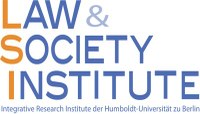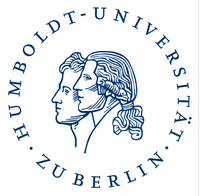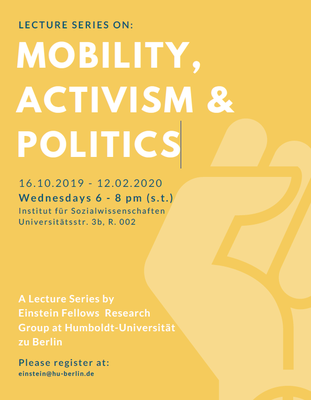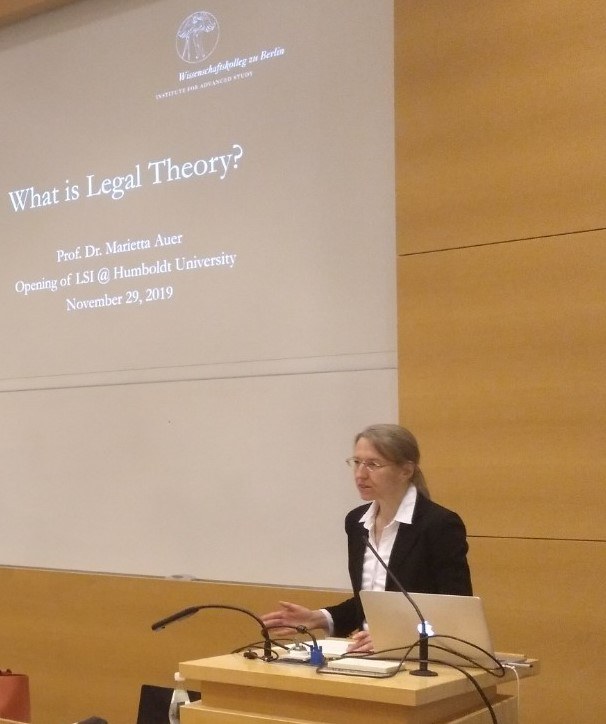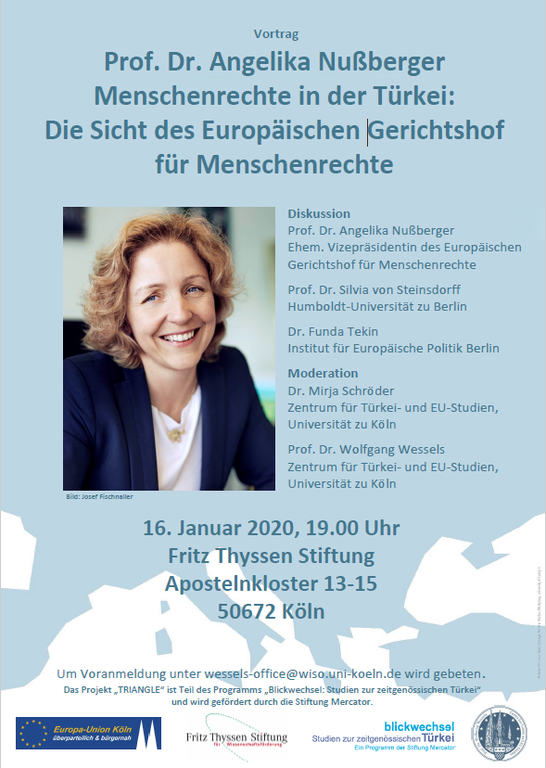An interdisciplinary dialogue between social and legal science was the motto and the aim of the first Berlin Winter School on Politics and Law, organised by the Centre for Socio-Legal Studies (University of Oxford), Centre Marc Bloch and the Integrated Research Institute Law & Society (Humboldt-Universität zu Berlin) from November 28 to 30 in Berlin. 25 PhD students and 17 speakers and panel discussant from various countries and a variety of academic disciplines attended the event, discussing methodological and theoretical challenges of socio-legal research. By combining the different academic perspectives on the implicit and explicit relationship between law and politics, the Winter School shed light on respective disciplinary blind spots, or questions not posed yet.
In a first keynote, Prof. Dr. Nicolas Dodier (École des hautes études en sciences sociales Paris, Wissenschaftskolleg zu Berlin) introduced a sociological approach to the relationship between law and politics and illustrated his conceptual thoughts by inquiring the place of victims in criminal trials.
In order to deepen the mutual understanding of the different disciplines for each other, a first practical session was dedicated to discussing two recent and highly controversial court decisions from both a social science and a legal perspective. Dr. Nahed Samour and Prof. Dr. Silvia von Steinsdorff (both Integrated Research Institute Law & Society) presented the case S.A.S vs. France which was brought before the European Court of Human Rights, ruling that the ban on face covering in France did not violate the provisions on right to privacy or freedom of religion of the European Convention on Human Rights. Dr. Bettina Lange (Centre for Socio-Legal Studies) and Dr. Johan Horst (Integrated Research Institute Law & Society), discussed the case Urgenda Foundation vs. State of the Netherlands of the The Hague Court of Appeal, the first legal decision summoning a national government to reduce greenhouse gas emissions. In both discussions, different methodological approaches to textual analysis and the role of extrajudicial knowledge were discussed.
Besides those sessions, participants were invited to present their PhD projects in poster sessions, a method which lead to very fruitful discussions, setting the basis for the exchange about those projects in the following days.
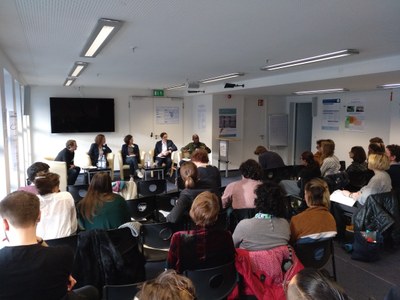
The second day was opened by a panel in which experienced scholars with different disciplinary backgrounds discussed the challenges of interdisciplinary working and writing and, thus, the difficult relationship between social sciences and jurisprudence in research practice. Moderated by Dr. Guillaume Mouralis (Centre Marc Bloch), Prof. Dr. Anna-Bettina Kaiser (Integrated Research Institute Law & Society), Dr. Kevin Grecksch (Oxford Centre for Socio-Legal Studies), Ass. Prof. Lionel Zevounou (University of Nanterre) and Dr. Andrea Kretschmann (Centre Marc Bloch) shared their views and experiences with the audience.
In the following workshop, those insights were put into practice in a writing session. Conducted by Dr. Ulrike Zeigermann (Centre Marc Bloch), the participants discussed different approaches and shared experiences about writer’s blocks, supervisors’ feedback and the challenge of translating thoughts into actual text.
In the afternoon, Dr. Anna Tsalapatanis (Oxford Centre of Socio-Legal Studies) gave a talk on a mixed-methods approach to socio-legal research, introducing the project “EURO-EXPERT” at Oxford University which combines qualitative and quantitative methods to examine the topic of cultural expertise in a variety of national courts in Europe.
In order to compare different national approaches, the final session for that day discussed regional particularities to socio-legal studies. Dr. Christian Boulanger (Humboldt-Universität zu Berlin) and Ass. Prof. Liora Israël (Ecole des hautes études en sciences sociales, Paris) introduced and discussed the examples of France, the US, the UK, and Germany, providing the audience with answers to the complex questions why the traditions of socio-legal research in those countries vary significantly.
The second keynote on Friday evening, held by Prof. Dr. Marietta Auer (Justus-Liebig-Universität Gießen and Wissenschaftskolleg zu Berlin), was dedicated to the question “What is Social Theory?”, advocating a closer link between dogmatic tradition and philosophical reflection. This lecture was, at the same time, part of the official opening of the LSI Berlin as the fourth Integrated Research Institute at the Humboldt-Universität zu Berlin. Please find more details here.
On the third day, the Winter School came even closer to an implementation of the discussions on interdisciplinary working and writing of the first two days: Prof. Dr. Sally Sheldon (Kent Law School), editor of the Journal Socio and Legal Studies, and Prof. Dr. Eva Kocher (Universität Frankfurt/Oder), editor of the Journal Kritische Justiz, shared their views about what a paper needs in order to be published in their journals.
With this session, the first Berlin Winter School on Politics and Law ended after three days full of discussions and fruitful exchange. We would like to thank all PhD students, speakers and the teams from the three hosting institutions who made that event a success. The submission of more than 150 applications from all over the world shows that there is a huge demand when it comes to interdisciplinary socio-legal studies. For follow up events and more information, please subscribe to our newsletter and stay updated.


